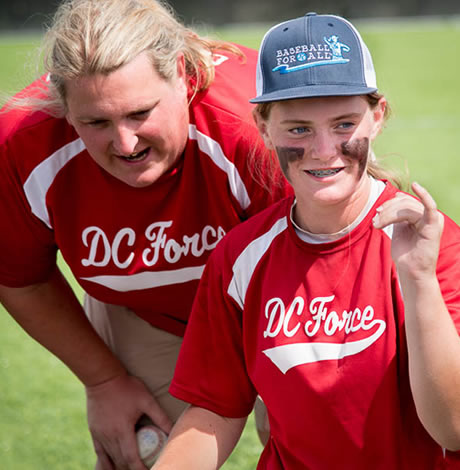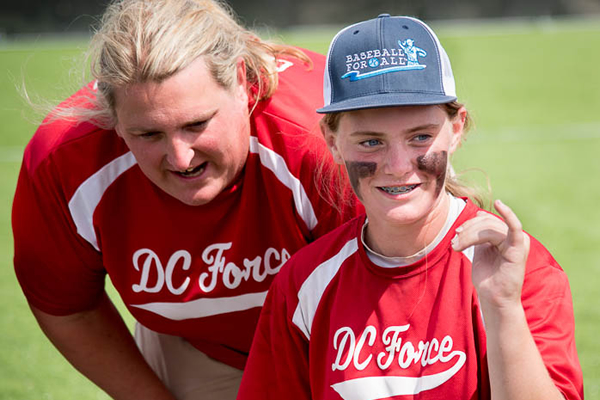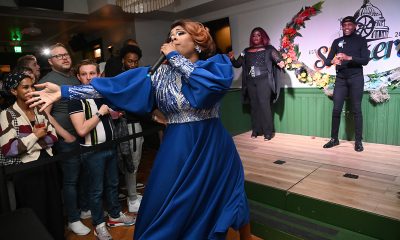Sports
Trans coach boosting visibility for girls’ baseball
‘Everyone should be able to play the sport that they love’


Ava Benach and daughter Paloma share a love of baseball. (Photo courtesy Ava Benach)
Ava Benach signed up her daughter Paloma to play little league baseball when she was five years old. At the time, she made the erroneous assumption that eventually, Paloma would have to switch to softball.
Ava and her wife Mona did sign Paloma up for softball at age 9. Paloma was having none of it. The next year, Paloma participated in an all-girls baseball team sponsored by Baseball for All that won a national tournament in Chino Hills, Calif. It was a boy’s tournament and they were the only girls team.
In 2015, the Benach family started recruiting girls locally and DC Girls Baseball was formed. The organization is the only girls’ baseball program in the region and it draws girls 18 and under from across the D.C. metro area, giving them an opportunity to play baseball at the highest levels.
Ava is serving as president, board chair and head coach of DC Girls Baseball. Along with coaching her now 14-year-old daughter, she also coaches the teams of her two sons, Teddy and Alex, who play with Capitol City Little League.
“Society is telling these girls that baseball is not a sport for them. They experience extreme loneliness if they play on boys’ teams and any mistakes are blamed on their gender,” says Ava. “I have deep admiration and respect for these girls and I love watching them turn into leaders. It is tremendously beneficial for them and builds their confidence.”
Ava’s own path to baseball began in Long Island. She played soccer and little league before switching over to a club team at age 12. In high school, she swam competitively and walked onto the team at Boston College where she swam for four years.
She came to the area in 1994 to attend law school at George Washington University and work on Capitol Hill. She has been an immigration lawyer since 1998.
She began coaching little league teams as each of her three kids became eligible to play.
The Benach household experienced a change recently as Ava transitioned to female. Throughout the process, Ava maintained her visibility.
“When you transition in your 40s, you are already a known quantity. It went better than I thought, and I didn’t lose any friends or clients,” Ava says. “I have a public image in both sports and my profession. I depend upon my reputation.”
The success of DC Girls Baseball drew the attention of the Eastern Women’s Baseball Conference (EWBC), which has been providing opportunities for women to play baseball for more than 20 years. The league features four teams – Montgomery County BarnCats, Baltimore Blues, Virginia Flames and Virginia Fury. They also field a travel team, DC Thunder, for tournament play.
A relationship was formed, and the two organizations began having clinics together. A few of the adult players from EWBC began coaching for DC Girls Baseball. Several of the girls have been recruited to the adult league and the adult travel team.
Paloma Benach was recruited last year to play on the Virginia Fury team in EWBC and she also plays on their travel team, DC Thunder. Normally a pitcher when playing girls baseball, Paloma is a utility player with EWBC to rest her pitching arm. She was 13 at the time and found herself facing experienced adults.
“At first I thought it would be difficult because they know more than I know,” says Paloma. “I do well but there are games where I need assistance.”
Paloma was joined on the team this year by Ava who plays third base. Now that they have a coach and teammate relationship, it brings up a certain question. What does Paloma call Ava?
“She calls me dad which is awkward sometimes in certain parts of the country,” says Ava. “It’s an actual historical biological fact. I don’t want to compete with my wife for the title of mother after 19 years of marriage.”
Both players have something to add in regard to the dynamic of playing together.
“She ignores me,” Ava says. “I have watched her play a thousand times and am amazingly proud of her, even though I am ruining her mojo.”
“Honestly, I try not to look at her. It’s too emotional so I view her as a coach and teammate,” Paloma says. “I think it’s amazing that she has given up so much of her time for all of this.”
The remaining months of summer will be a busy time for both of them. Along with DC Girls Baseball and EWBC, Paloma is playing on the Moose Baseball travel team where she is the only girl. This fall she will try out for her school’s girls’ basketball team and the boys’ baseball team. There will also be baseball tournaments including two stops at Beyer Stadium, former home of the Rockford Peaches.
The gender barrier in baseball continues to improve and this year, Major League Baseball and USA Baseball launched the 2018 Girls Baseball Breakthrough Series to provide opportunities for girls who wish to continue playing or working in baseball.
“There are always going to be people who are not OK with girls playing baseball, but we have created a community where people can be who they are,” says Paloma. “I love this sport and am happy to be surrounded by people who support me and love me.”
“These girls are just asking for the chance to play baseball,” Ava says. “Everyone should be able to play the sport that they love.”

More than a dozen LGBTQ athletes won medals at the Milan Cortina Winter Olympics that ended on Sunday.
Cayla Barnes, Hilary Knight, and Alex Carpenter are LGBTQ members of the U.S. women’s hockey team that won a gold medal after they defeated Canada in overtime. Knight the day before the Feb. 19 match proposed to her girlfriend, Brittany Bowe, an Olympic speed skater.
French ice dancer Guillaume Cizeron, who is gay, and his partner Laurence Fournier Beaudry won gold. American alpine skier Breezy Johnson, who is bisexual, won gold in the women’s downhill. Amber Glenn, who identifies as bisexual and pansexual, was part of the American figure skating team that won gold in the team event.
Swiss freestyle skier Mathilde Gremaud, who is in a relationship with Vali Höll, an Austrian mountain biker, won gold in women’s freeski slopestyle.
Bruce Mouat, who is the captain of the British curling team that won a silver medal, is gay. Six members of the Canadian women’s hockey team — Emily Clark, Erin Ambrose, Emerance Maschmeyer, Brianne Jenner, Laura Stacey, and Marie-Philip Poulin — that won silver are LGBTQ.
Swedish freestyle skier Sandra Naeslund, who is a lesbian, won a bronze medal in ski cross.
Belgian speed skater Tineke den Dulk, who is bisexual, was part of her country’s mixed 2000-meter relay that won bronze. Canadian ice dancer Paul Poirier, who is gay, and his partner, Piper Gilles, won bronze.
Laura Zimmermann, who is queer, is a member of the Swiss women’s hockey team that won bronze when they defeated Sweden.
Outsports.com notes all of the LGBTQ Olympians who competed at the games and who medaled.
Sports
US wins Olympic gold medal in women’s hockey
Team captain Hilary Knight proposed to girlfriend on Wednesday

The U.S. women’s hockey team on Thursday won a gold medal at the Milan Cortina Winter Olympics.
Team USA defeated Canada 2-1 in overtime. The game took place a day after Team USA captain Hilary Knight proposed to her girlfriend, Brittany Bowe, an Olympic speed skater.
Cayla Barnes and Alex Carpenter — Knight’s teammates — are also LGBTQ. They are among the more than 40 openly LGBTQ athletes who are competing in the games.
The Olympics will end on Sunday.
Sports
Attitude! French ice dancers nail ‘Vogue’ routine
Cizeron and Fournier Beaudry strike a pose in memorable Olympics performance

Madonna’s presence is being felt at the Olympic Games in Italy.
Guillaume Cizeron and his rhythm ice dancing partner Laurence Fournier Beaudry of France performed a flawless skate to Madonna’s “Vogue” and “Rescue Me” on Monday.
The duo scored an impressive 90.18 for their effort, the best score of the night.
“We’ve been working hard the whole season to get over 90, so it was nice to see the score on the screen,” Fournier Beaudry told Olympics.com. “But first of all, just coming out off the ice, we were very happy about what we delivered and the pleasure we had out there. With the energy of the crowd, it was really amazing.”
Watch the routine on YouTube here.




















